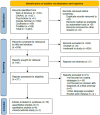Coping strategies following the diagnosis of a fetal anomaly: A scoping review
- PMID: 37089477
- PMCID: PMC10118031
- DOI: 10.3389/fpubh.2023.1055562
Coping strategies following the diagnosis of a fetal anomaly: A scoping review
Abstract
Introduction: Many women experience severe emotional distress (such as grief, depression, and anxiety) following a diagnosis of fetal anomaly. The ability to cope with stressful events and regulate emotions across diverse situations may play a primary role in psychological wellbeing. This study aims to present coping strategies after disclosing a fetal anomaly to pregnant women.
Methods: This is a scoping review based on the Preferred Reporting Items for Systematic Reviews and Meta-Analyses (PRISMA) extension for scoping reviews (PRISMA-ScR). Electronic databases, including Web of Science (WOS, BCI, KJD, MEDLINE, RSCI, SCIELO), CINAHL, and EBSCO PsycARTICLES, were used to search for primary studies from the inception of each database to 2021. The keywords were determined by existing literature and included: "fetal anomaly," "fetal abnormality," "fetal anomaly," "fetal abnormality" AND "cope," "coping," "deal," "manage," "adapt*," "emotion* regulate*," with the use of Boolean operators AND/OR. A total of 16 articles were reviewed, followed by advancing scoping review methodology of Arksey and O'Malley's framework.
Results: In this review, we identified 52 coping strategies using five questionnaires in seven quantitative studies and one mixed-method study. The relationship between coping strategies and mental distress was explored. However, the results were inconsistent and incomparable. We synthesized four coping categories from qualitative studies and presented them in an intersection.
Conclusion: This scoping review identified the coping strategies of women with a diagnosis of a fetal anomaly during pregnancy. The relationship between coping strategies and mental distress was uncertain and needs more exploration. We considered an appropriate measurement should be necessary for the research of coping in women diagnosed with fetal anomaly pregnancy.
Keywords: coping strategies; fetal anomaly; mental distress; scoping review; women's health.
Copyright © 2023 Zhang, Chen, He, Li, Peng, Xie, Hu and Qin.
Conflict of interest statement
The authors declare that the research was conducted in the absence of any commercial or financial relationships that could be construed as a potential conflict of interest.
Figures




References
-
- Arulkumaran S, Ledger W, Denny L, Doumouchtsis S, editors. Oxford Textbook of Obstetrics and Gynaecology. Oxford: Oxford University Press; (2020). 10.1093/med/9780198766360.001.0001 - DOI
-
- Zhang X, Chen L, Wang X, Wang X, Jia M, Ni S, et al. Changes in maternal age and prevalence of congenital anomalies during the enactment of China's universal two-child policy (2013–2017) in Zhejiang Province. China: An observational study. PLoS Med. (2020) 17:3047. 10.1371/journal.pmed.1003047 - DOI - PMC - PubMed
-
- Nazaré B, Fonseca A, Canavarro MC. Adaptive and maladaptive grief responses following TOPFA: actor and partner effects of coping strategies. J. Reprod Infant Psychol. (2013) 31:257–73. 10.1080/02646838.2013.806789 - DOI

